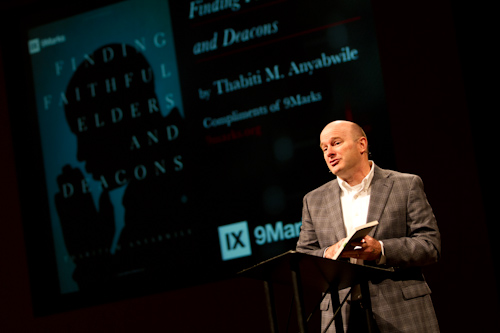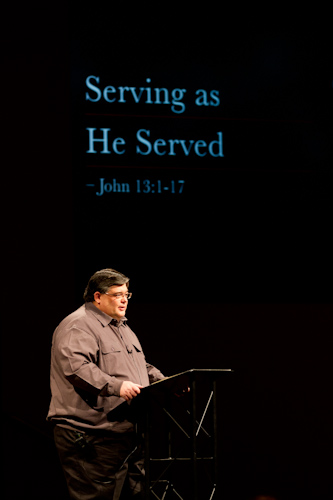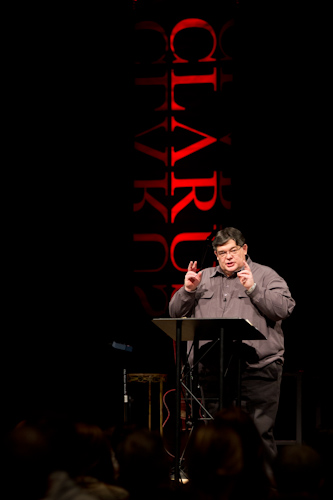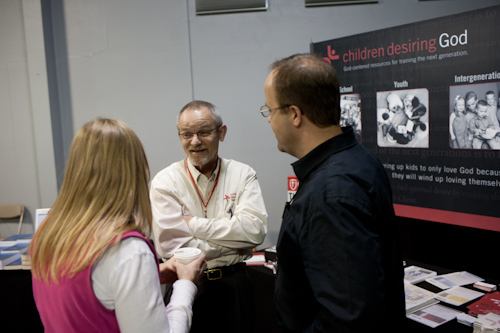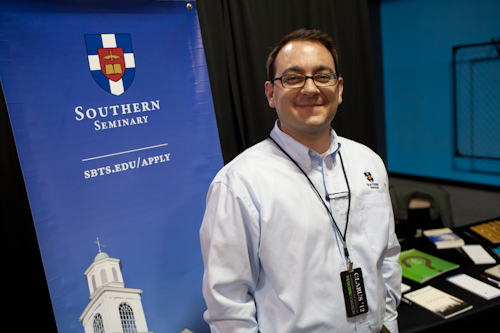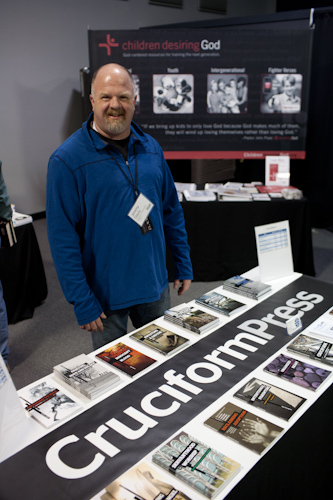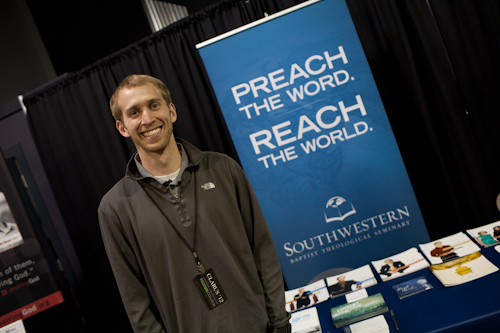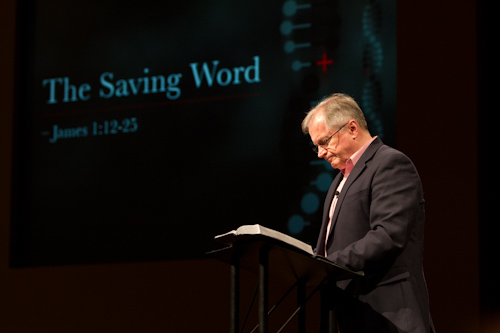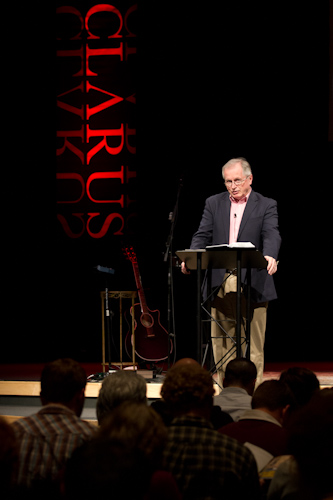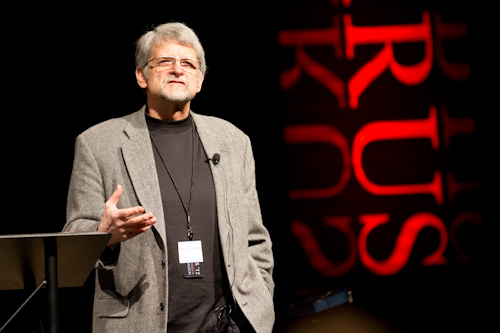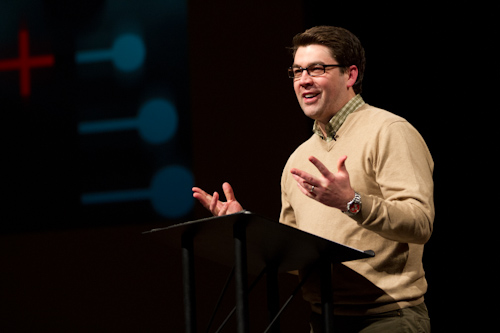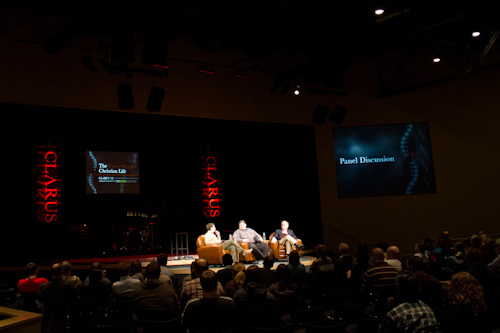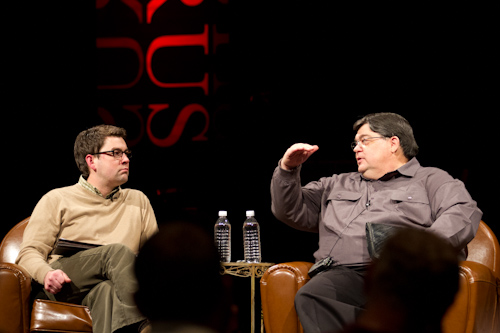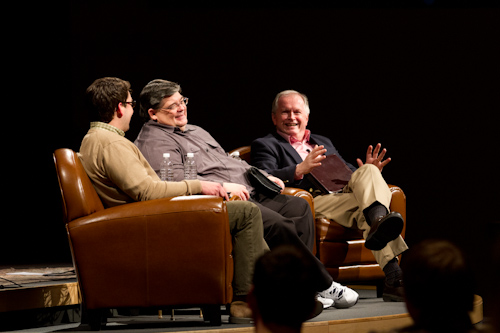Archive for the Clarus 12 Category
Mar 11
Session 6 Recap: Panel Discussion with Carson and Zaspel
Editor’s Note: John Hunt is the Senior Pastor at Covenant of Grace Church in Albuquerque, NM. He is a member of the Albuquerque Chapter of The Gospel Coalition. This post is a summary of a Panel Discussion with D.A. Carson and Fred G. Zaspel from Saturday evening, March 10.
••••
The question and answer segment of the conference dealt with three areas related to the Christian life: sanctification, old nature/new nature, and pacifist/activist approaches to Christian living.
Asked for a good definition of sanctification, Dr. Zazpel pointed out four senses: (1) positional sanctification, wherein we are sanctified in Christ; (2) definitive sanctification, wherein we are sanctified or set apart by Christ in the gospel; (3) final sanctification or glorification; and (4) progressive sanctification wherein we are progressing in holiness. To this Dr. Carson pointed out that while justification and sanctification are distinct, they are not inseparable. Justification and sanctification flow out of our union with Christ.
Dr. Carson explained that holiness is really an adjective for God. He represented holiness as three concentric circles. The center circle is God Himself, or Holy, Holy, Holy. The second circle is those things associated with God. For example, the shovel in the Temple was holy, not in itself, but because it was related to God. The third circle represents people. It is at this point that morality enters the discussion. However, it is not so much morality that is in view. God is not telling believers to be moral because He is moral. Rather, He is calling believers to become peculiarly His.
Related to this issue is Warfield’s denial that Christians have two natures. Dr. Zazpel pointed out that for Warfield, Christians have been renewed and that the grasp of sin has been broken. During the conversation, Romans 7 was bought up and discussed. It seems that the bottom line is this: the Christian must deal with a renewed nature that must eradicate sin. It’s not like two natures are warring against one another. Rather, it is the “I†who struggles with remnants of sin, but the “I†does so from the vantage point of a new, or renewed nature.
Closely related to the above discussion was the question posed to Dr. Zazpel regarding Warfield on “Perfectionism.†He pointed out that one cannot speak of “Perfectionism†without referring to the type one has in view, e.g. Wesleyan Perfectionism. Closely related is the Higher Life movement the roots of which go back to Keswick, England and the Keswick Theology that emerged. The emphasis here was not perfectionism, but total surrender, living a victorious Christian life, letting go and letting God, etc. Dr. Carson added that for both Warfield and Luther, Christians will always be saints and sinners. A memorable saying offered by Dr. Carson (and I don’t think I have it exactly right) helped immensely: “I’m not what I ought to be; I’m not what I shall be; I’m not what I shall be, but I’m not what I was. By the grace of God, I am what I am.â€
There was much more than here represented, but I close on a part of the discussion, which was very meaningful to me. The question was asked concerning a debate on the blog of TGC regarding rest and effort. Some emphasize the need to rest in Christ. Others emphasize the need to exert oneself in the Christian life. As was pointed out, one could preach “Do, Do, Do,†which destroys God. On the other hand, one could preach “Done, Done, Done,†which results in a do nothing approach. Grace has entitlements of doing. So, what is the balance? The balance is found in Philippians 2:12-13, the Christian is to work out his salvation, because God is working in them. Every work of man requires the antecedent work of God.
Mar 11
Session 5 Recap: Zaspel, “Forgiving As Forgiven” – Matthew 18:15-35
Editor’s Note: Michael Kelshaw is the Head Minister at Trinity at the Marketplace in Albuquerque NM. He is a member of the Albuquerque Chapter of The Gospel Coalition.  This post is a summary of Fred G. Zaspel’s message from Saturday evening, March 10, “Forgiving As Forgiven,” from Matthew 18:15-35.
••••
On Saturday evening we had the great privilege of listening to Dr. Fred Zaspel preach on Matthew 18:15-35. He unpacked the passage under the title “Forgiving As Forgivenâ€. The title brings out the main theme of the passage, which is about forgiveness. Highlighting that at the heart of the gospel is the fact that our sins are forgiven, as those who are in the kingdom of God we are a forgiving people. Dr. Zaspel brought this out of the text in three ways.
First of all, the goal of forgiveness is reconciliation (vv. 15-20).
In other words, forgiveness aims at reconciliation. In (v. 15), Jesus shows that the goal, the objective in all of this, is to gain our brother. In the kingdom of God, forgiveness is the dominant note. God brings sinners into fellowship with Himself through the forgiveness of our sins. As those in Christ, we have fellowship with Him, and by His grace are able to forgive others.
The wonderful reminder here is that while we are rightly ready to go through all of the stages outlined in these verses, the reason that we attend to these steps is for reconciliation. We are to tell him his sin, in order to gain our brother.
Secondly, the cost of forgiveness is the payment of the debt (vv. 23-27).Â
In these verses the king had to absorb the debt, he had to pay the debt himself. In (v. 27), in order to forgive the servant, the master had to pay the debt himself. In forgiveness the debt is paid by another, forgiveness demands substitutional payment of the debt. Here is the meaning of the cross of Christ, that Jesus stood in the place of sinners, absorbed the debt of others, and paid the debt in full. We stand before God with an incalculable debt that we cannot pay ourselves, and Jesus in our place has paid the debt in full. In order to forgive our brother, we have to absorb the debt, and make payment for it ourselves, and so Jesus is holding up His cross to govern the relationships in His kingdom.
The helpful reminder here is that as those who have been forgiven an immeasurable debt by Jesus in our place fully and freely, we are able to forgive others in that same way. No matter what it costs, it is nothing compared to the forgiveness that has been given us.
Thirdly, the demand of forgiveness is yet more forgiveness (vv. 21-23; 28-35).
Again, the gospel is the model. In order to be saved there is full pardon of our sins, and so as those in Christ, there must be no end to the forgiveness that we are willing to grant to our brother. In (v. 21) Peter asks, in essence, how much is enough. Jesus answers the question by driving home the fact that there are to be no limits on how much you forgive your brother, as He shows in (v. 22).
The important reminder here is that the mercy that we have received is the mercy that we will show to our brother. We delight in this mercy, and as those who have been forgiven an immeasurable debt, we can forgive others. So the people in the kingdom of God are a forgiving people.
Let us recall frequently that we are a people who have been forgiven an immeasurable debt, and in the grace of God are able to forgive others. Let us remember that this is part of living the cross-shaped Christian life.
Mar 11
Photos from Saturday at Clarus ’12
Yesterday we posted photos from Friday night’s opening sessions for Clarus ’12. Our second day of Clarus is by far the busiest day of the conference, with five sessions – two in the morning, one in the afternoon, and two at night. Here are some photos from throughout the day:
Saturday Morning
Saturday Afternoon
Saturday Evening
Mar 10
Peacemaker Ministries Session Recap: Rick Friesen, “Handling Everyday Conflictâ€
Editor’s Note: Tim Bradley is Pastor for Biblical Counseling and Family Ministry at Desert Springs Church in Albuquerque, NM. This post is a summary of Rick Friesen’s message, “Resolving Everyday Conflict,” from Saturday afternoon, March 10, representing Peacemaker Ministries.
••••
This year at the Clarus conference, we were blessed to have a special session with Rick Friesen from Peacemaker Ministries. The mission of Peacemaker Ministries is to equip and assist Christians and the church to respond to conflict biblically. The ministry says, “As people reconciled to God by the death and resurrection of Jesus Christ, we believe that we are called to respond to conflict in a way that is remarkably different from the way the world deals with conflict (Matthew 5:9, Luke 6:27-36, Galatians 5:19-26).â€
As Rick began his session he stated that he wanted to introduce change into our view of conflict. He helped us to understand on the one hand, that conflict is a part of our lives, and many times we are not aware of it. Sometimes there are blinders on to the reality of conflict within our relationships and churches. But, he also helped us to see that sometimes we simply accept conflict as a part of life that is going to be there, so we don’t pursue biblical reconciliation and peace. Rick showed us that conflict is a part of our lives as a result of sin, and that God, having reconciled us to Himself, also wants us to be reconciled in our relationships with one another. He said, “So many times we say, ‘I’m reconciled to God, but not with my brother’ as if this is ok, but that it is not ok.†He asserts that as Christians, by the grace of God, we can begin to repair and heal the brokenness of conflict.
Peacemaker’s says, “We believe that conflict provides opportunities to glorify God, serve other people, and grow to be like Christ (Romans 8:28-29, 1 Corinthians 10:31-11:1, James 1:2-4, Philippians 2:3-4). This begins to get at the heart of their purpose to help change our view of conflict. Do you normally think of the word “opportunity†connected to conflict? Is your desire in conflict to love God, love others and grow in grace? Or in contrast, does your desire in conflict center upon what you want?
James 4 helps us to understand that our conflicts with one another are rooted in desires that become so important to us that our desire to glorify God, serve others, and grow in grace disappear, and we are willing to fight and quarrel in order to obtain what we want. This is what Rick described as an idol, and he said this desire (idol) goes through a progression over time. Sometimes this progression happens quickly, and with some desires it happens more slowly over time. This progression starts with desire, then a desire begins to morph into a need, and then a demand, next it becomes an expectation, and if unmet, a disappointment, and if we’re disappointed we judge the other person, and punish them. This progression is one that takes place in our hearts, is focused on self, opposes God, and yields conflict in our relationship with others. At its essence, this desire, even a good desire, becomes so important that we are willing to sin in order to obtain it.
Rick asked, “Where is God in this situation?†We have a tendency to only view things horizontally, and forget about God’s desire for us in a given conflict. In fact, we forget God, and that we are His ambassadors. We forget to seek to glorify God (1 Corinthians 10:31), we forget to face and deal with our own sin (Matthew 7:1-5), and we forget to seek peace in our relationships through restoration and reconciliation (Galatians 6:1, Matthew 5:23-24).
Finally, Rick asks, “How does the gospel make a difference in our relationships?†How does it transform our conflict from a moment of self-focused idolatry into an opportunity for God-exalting grace and love? First, remember who God is. Remember His benevolent, merciful, saving grace in your life. Remember you are His child and ambassador. Remember that other Christians are also His beloved sons and daughters. And remember that unbelievers are image bearers of God and need His grace and salvation. Remember the gospel, and let it transform your conflict into opportunities to see God glorified in his church as our relationships healed and restored.
Mar 10
Session 4 Recap: Carson, “The Saving Word” – James 1:12-25
Editor’s Note: Tim Ragsdale is Pastor for Local Missions at Desert Springs Church in Albuquerque, NM. This post is a summary of D.A. Carson’s message from Saturday morning, March 10, “The Saving Word,” from James 1:12-25.
••••
Dr. D.A. Carson, in his message “The Saving Word,†drew from James 1:12-25 to teach about how Christians are to respond to trials and suffering. We were introduced to a pair of contrasting English “chaps.” The first was a gifted preacher and communicator who, over the years had committed adultery and lost his pastorate on multiple occasions. If pressed on “how could you do this?†he would simply quote 1 Corinthians 10:13 “No temptation has overtaken you that is not common to man. God is faithful, and he will not let you be tempted beyond your ability, but with the temptation he will also provide the way of escape, that you may be able to endure it,†and claim “I could not endure it, therefore God is a liar!” The second chap was a faithful man who had tragically lost each of his children and finally his wife to Alzheimer’s disease. When testifying to God’s grace, this man never demonstrated any bitterness.
We will all face trials, temptations, persecutions, and other suffering. How do we face it faithfully?
1. Remember the Christian’s goals.
If our goal is a life free of pain, any and all suffering will result in bitterness. If our goal is maturity in Christ, we will endure suffering gracefully, knowing that such testing refines us leading to “the crown of life†(v. 12; cf. Revelation 2:10).
2. When you confess God’s sovereignty, don’t misunderstand His motives.Â
God does not tempt us, but He does test us. Temptation is an impulse to sin –something God is not susceptible to in the least. Equally absurd is for us to infer that God would have any motive to lead us into sin. Sin is a product of our own hearts (v. 14). God’s sovereignty is not threatened (theologically) by human responsibility.
3. When you feel abandoned and crushed, remember that God is good.
In verse 18 we see God, “brought us forthâ€Â (ESV), or elsewhere translated, “begat … us†(KJV), “gave us birth†(NIV). This is not merely physical birth, but the new birth brought about by “the Word of Truth,†that is, the Gospel (cf. Ephesians 1:13). The gospel is the ultimate example of God’s goodness. Don’t doubt God’s goodness!
4. When you hear gospel instruction, do not merely listen to it.Â
Don’t just listen and fool yourself. Don’t listen to Gospel proclamation as though it is simply for the unbeliever. The word of the Cross is the power of God to those of us being saved (1 Corinthians 1:18). Salvation extends beyond justification (forensic declaration) to sanctification (life-long process of becoming more like Christ), and ultimately to glorification (Romans 8:29-30). We cannot underestimate the centrality and importance of the Gospel in our sanctification. It is the Holy Spirit that transforms us (crushing pride and fostering humility) and empowers us unto obedience.








